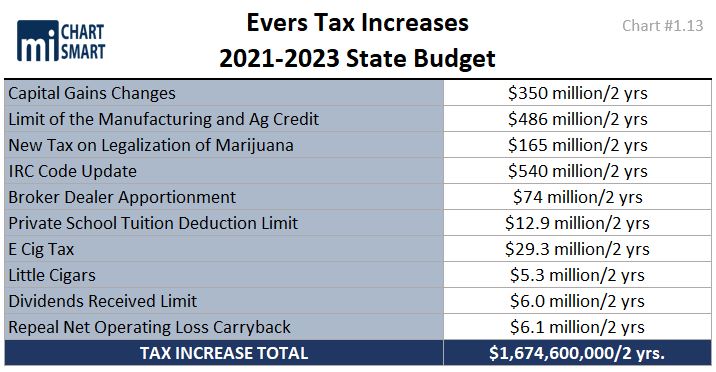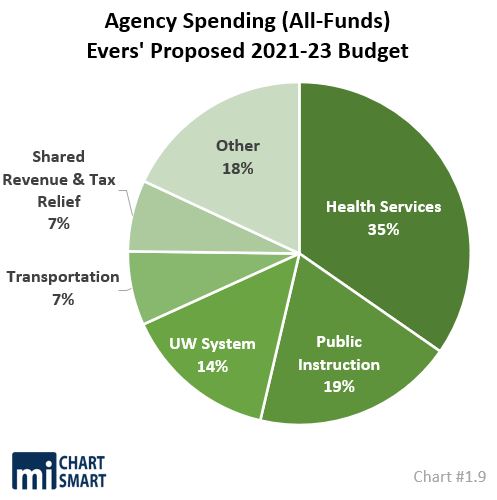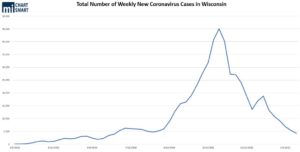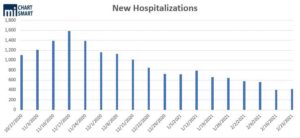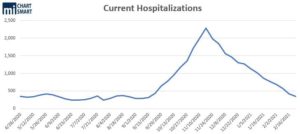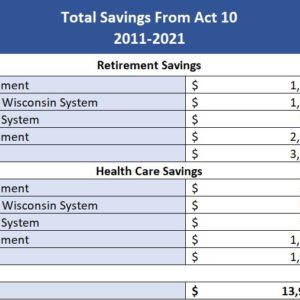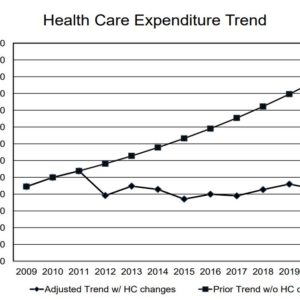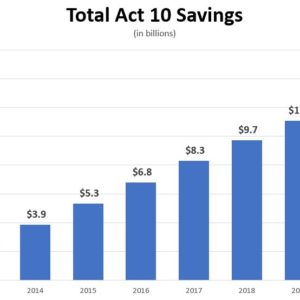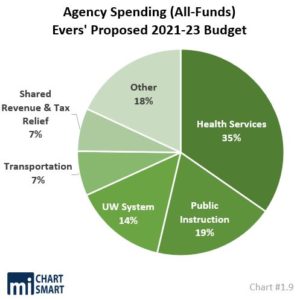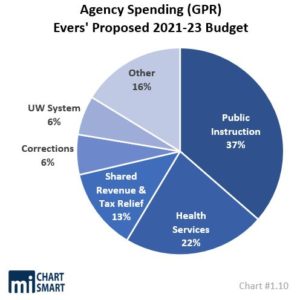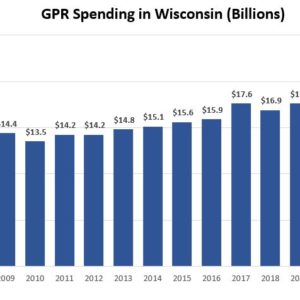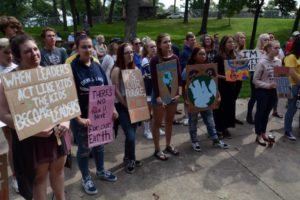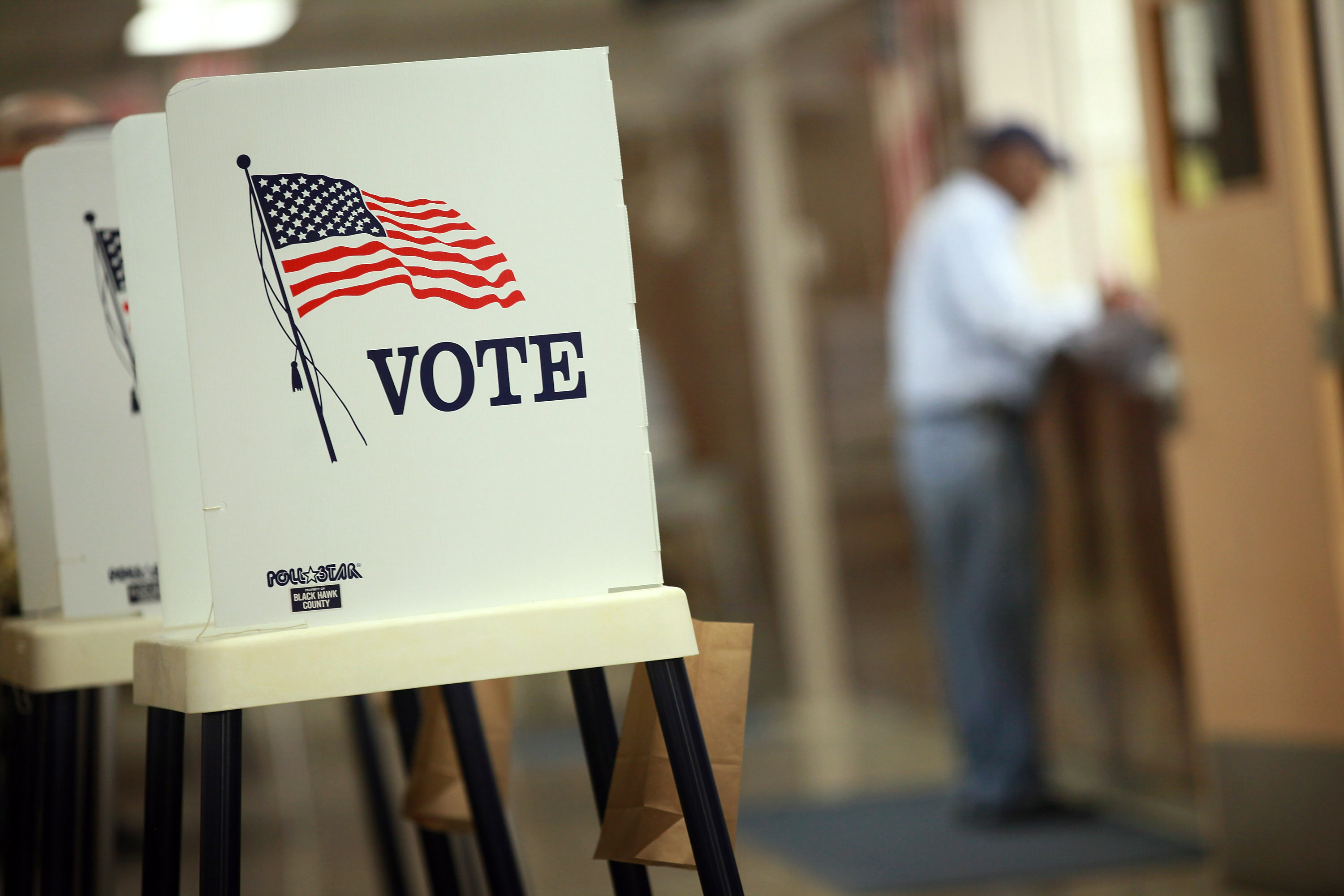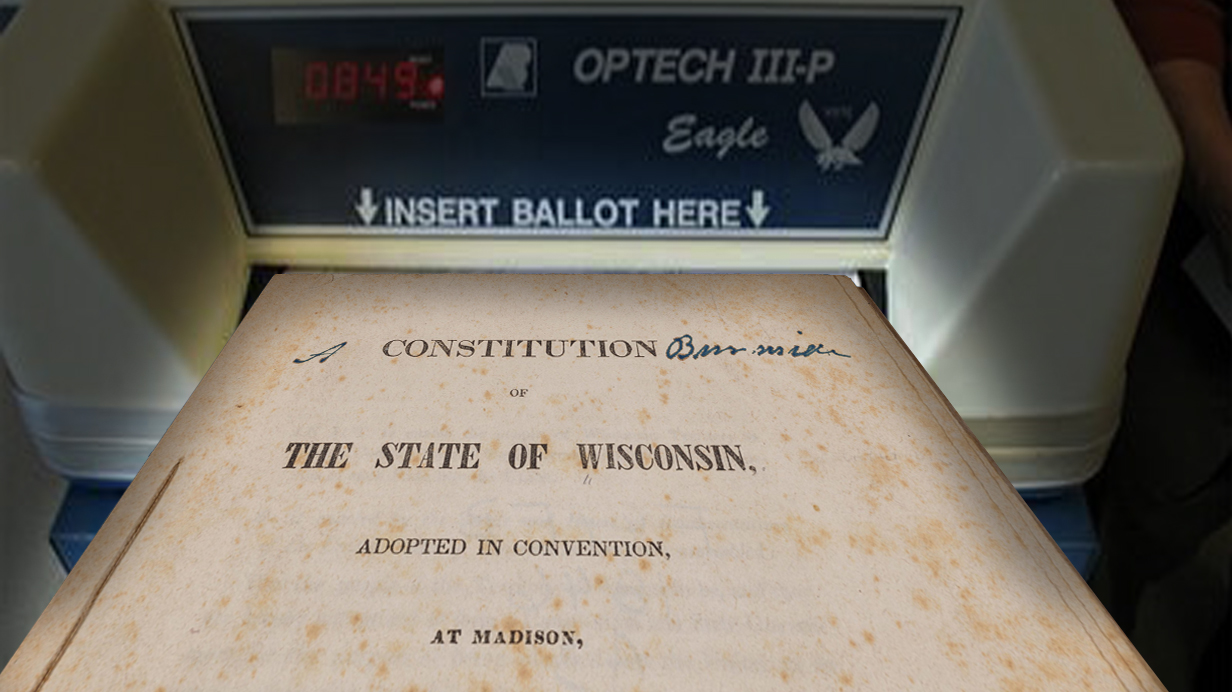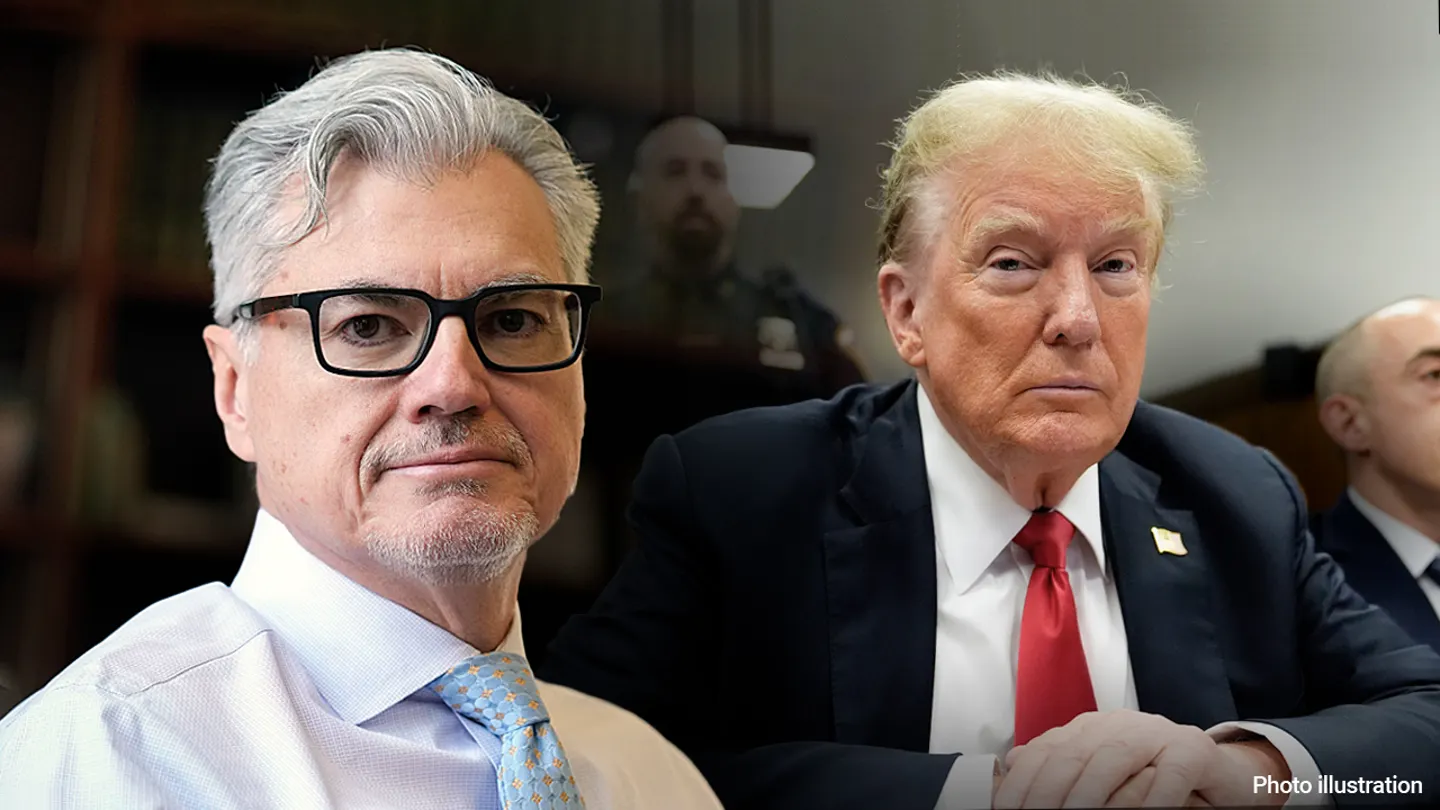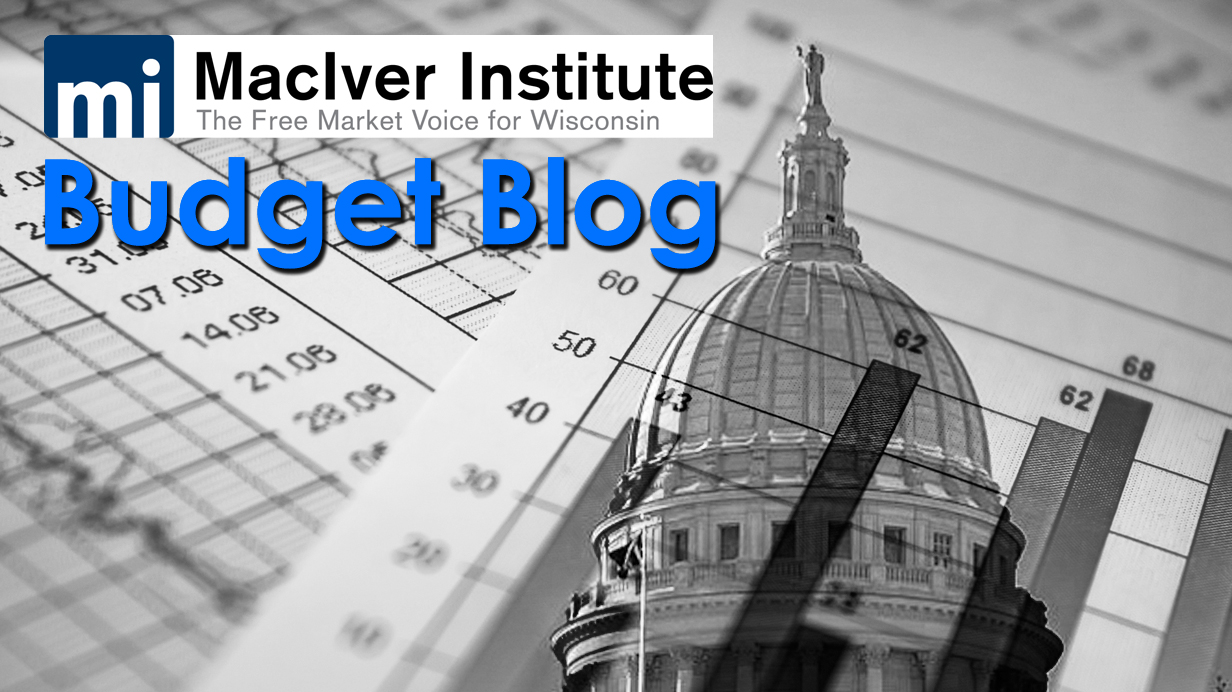
Massive spending increase, billions in higher state taxes, tens of millions in higher property taxes again
Evers wants to overturn Act 10, legalize marijuana, implement automatic voter registration and reduce new voter residency requirement to 10 days
Repeals Right to Work, mandates gun background checks for all, makes it easier for counties and cities to increase sales taxes
School Choice targeted, UW tuition freeze continues, no gas tax increase and allows law enforcement to hire noncitizens as officers
By MacIver Staff
Gov. Tony Evers recently rolled out his second budget proposal, a gigantic $91 billion spending plan that will, according to the Governor, help Wisconsin recover from the ill effects of COVID-19 and the government shutdown of the state’s economy. As with his first budget, the 2021-2023 version seeks to dramatically increase government spending in Wisconsin, raise taxes on the many to hand out aid to the select few, and create dozens of new initiatives to address social justice, equity, global warming and the public health crisis.
The Governor is calling the two-year budget a blueprint “to make sure we bounce back and better than before.”
While the Governor will apparently try to convince the public that his budget is necessary to combat COVID-19, the charts below suggest that we have weathered the worst of the COVID-19 storm and a return back to our normal way of life is warranted. Returning back to our normal way of life would, of course, mean ending all state and local restrictions on commerce, businesses and our schools. Even though the science clearly shows that Wisconsin should be fully open at every level, Governor Evers has refused to even consider immediately reopening our state and, in fact, the Governor is talking about the need for restrictions to be in place for many months ahead.
Using the virus as his justification, the Governor has jammed dozens of new policy initiatives into the tax and spending plan that have nothing to do with the pandemic. Just like in his first budget, Gov. Evers is attempting to greatly expand the size and the scope of state government by adding a long laundry list of progressive and ultra-liberal policy initiatives.
The Governor wants to overturn Act 10 and the $14 billion in taxpayer savings (see below) it has provided, dictate that schools teach global warming, prevent the building of new reliable and inexpensive coal plants in Wisconsin by injecting the “social cost of carbon” into the decision-making process, increase the cost of government building projects by requiring they pay artificially-high wages, legalize marijuana, create a new cabinet-level Chief Equity Officer, move the state towards a government-controlled, single-payer health care system, create a new office of environmental justice, implement automatic voter registration and permit county sheriffs and local police chiefs to “hire noncitizens as officers.”
The Governor, once again, proposes to create a new entitlement for tens of thousands Wisconsinites by expanding Medicaid, he wants to pump an additional $1.4 billion into K-12 education even though education funding is at an all-time high, give $190 million more to the University of Wisconsin System, immediately increase the minimum wage to $10.15 an hour which will lead to fewer jobs for those in need of a entry-level position, and repeal work requirements for childless adults to receive Medicaid benefits and FoodStamps, to literally name just a few of his new initiatives.
Republican leaders of the Legislature immediately called out the Governor for his partisan and unserious budget proposal.
“The Governor’s budget is completely irresponsible and unrealistic,” Senate Majority Leader Devin LeMahieu (R-Oostburg) commented. “It’s reckless with tax dollars and loaded with divisive policies that move our state backward.”
Assembly Speaker Robin Vos (R-Rochester) said that “instead of priorities to move the state forward, his $91 billion budget is more of a political document to fill the wish lists of his own party. The governor’s 2021-23 budget is simply an unrealistic proposal. The spending plan contains far too many poison pills like expanding welfare, capping school choice enrollment, legalizing recreational marijuana, repealing Act 10 and growing the size of government.”
There is growing speculation that Legislative Republicans will throw out large portions of the Governor’s new budget or the entire document and start over using the last budget as the base. In the 2019-2021 budget, Republicans discarded much of the Governor’s budget before they started their work. If this were to happen again, it would take 9 ‘yes’ votes in the Joint Committee on Finance (JCF) to add back in any of Governor Evers’ initiatives. Republicans outnumber Democrats on JCF, the Legislature’s budget writing committee, 12 to 4.

2021-2023 State Budget Basics
Taxes, Spending And New Government Employees
As always, MacIver starts our preliminary analysis with the budget basics – how much this budget spends, what taxes are increased or cut and by how much, the number of new government workers and the amount of borrowing Gov. Evers proposes.
Actually, we will start with the state’s current fiscal condition. As MacIver reported recently, despite the Evers shutdown of the economy in 2020, Wisconsin is in a good place financially speaking. According to the nonpartisan Legislative Fiscal Bureau (LFB), state government will end Fiscal Year (FY) 20-21 with a net balance of $1,766,380,100. The $1.76 billion balance is $629,500,00 higher than a November 2020 estimate and means that we will start the next budget cycle, FY 21-22, with an unexpected billion-and-a-half dollars to fund state government operations.
One of the biggest drivers of state government spending is the cost to provide health care for the vulnerable and our Medicaid program. The good news here is that Wisconsin has another surplus, a surplus in the Medicaid program. For many years during the Walker Administration, our Medicaid program ran a deficit, forcing Walker to dramatically increase state support for the program and look for ways to reform the program to control costs. The federal government recently increased the state reimbursement level from 59.4% to 65.6% because of the COVID-19 crisis and that move has resulted in a $685 million surplus in the state’s Medicaid account.
Finally, as we start this open and honest discussion about the next state budget and how much it will cost to provide vital and critical services for those truly in need, we must recognize the incredible amount of federal COVID-19 aid that has been sent to state government and Wisconsinites directly.
To date, the federal government has spent $14.9 billion in Wisconsin to combat COVID-19 and minimize the economic impact of the government shutdown of our economy. For comparison purposes, Wisconsin’s entire two-year budget spends almost $84 billion all funds.
To ignore this gigantic amount of federal aid or act as if the $14.9 billion should not be a part of the budget discussion is disingenuous to say the least. A cynic might argue that ignoring the $14.9 billion is a deliberate attempt to mislead the Wisconsin public and make it seem like we have no choice but to dramatically increase taxes in order to fund a massive $7 billion increase in new spending.
So, we head into the 2021-2023 budget debate in the black with a sizeable surplus, thanks in part to federal COVID-19 assistance, which makes the Governor’s tax and spend blueprint all the more perplexing.
State Government Spending At Historic Levels And Heading Higher
Gov. Evers’ 2021-2023 state budget would spend a colossal $91 billion all funds (AF) over two years if adopted without changes. That would be a $7 billion spending increase, or 8.33% more than the last budget. It is important to note that this new spending increase would be on top of an even bigger spending increase contained in the last budget. That budget, the 2019-2021 state budget as approved by the Republican-controlled Legislature, contained an increased spending by almost $8 billion. If Gov. Evers’ second spending proposal is approved as is, state government spending will increase by $15 billion or 19.74% by the end of his first term, a massive spending spree never seen before in our state’s history.
For comparison purposes, the spending increases included in the budgets of Gov. Walker averaged $2 billion per budget. If approved, the spending increases included in the budgets of Gov. Evers will average $7.5 billion per budget.
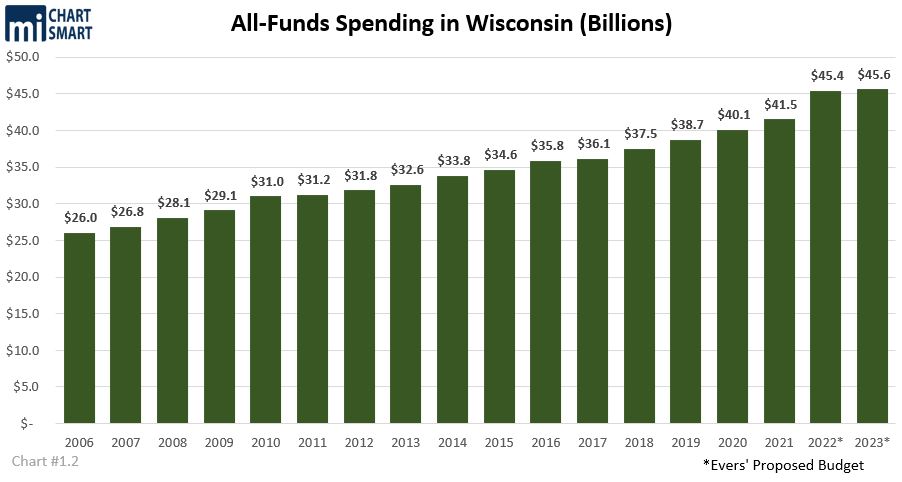
State Tax Increases To Pay For All That Spending
Thankfully, the Governor does not propose a general income, corporate or sales tax increase at the state level. Very welcomed news.
The Governor instead raises a bunch of smaller taxes to pay for all the new spending. Despite having $1.76 billion in the starting balance, $14.9 billion in COVID-19 federal aid spent here in 2020 and a $685 million surplus in the Medicaid program, Gov. Evers believes it is necessary to raise taxes by at least $1.67 billion in his budget proposal. The list of tax increases is a long one. Evers wants to increase taxes on capital gains by $350 million according to the Department of Administration estimate. He would increase taxes on certain manufacturers $486 million by limiting the amount of the Manufacturing and Agriculture Credit that can be claimed.
The Governor would also raise new tax revenue by legalizing marijuana and taxing it. According to the DOA summary, the new marijuana tax would raise $165 million in FY 23.
In addition to taxing people who successfully invest in the stock market or those who sell their homes for a profit, and the sale of marijuana, Evers is proposing a tax increase on“broker dealers,” E cigarettes, “little cigars”, parents who send their children to private school, dividends received and net operating loss carrybacks.
This lengthy list and hefty tax increase total is preliminary. We are still combing through every line of the budget and the number of tax increases and the total tax increase amount could go higher.
Property Taxes Keep Going Up
The time of Walker’s year-after-year statewide property tax freeze is long gone. Gov. Evers’ second budget will allow local units of government to raise your property taxes by at least 2%. Right now, local units of government are allowed to raise property taxes only if a community experiences growth. So, under the Evers proposal, the minimum your property taxes will increase is 2% for each local unit of government. Evers proposed a similar increase in his last budget but the provision was removed by the Republican-controlled Legislature. According to 2019-2021 budget documents, if this provision would have become law in the last budget, property taxpayers in 98% of counties and municipalities would have experienced a tax increase.
County government, your village or city government, your school district and your local technical college – all will be allowed to increase your property tax bill. We will examine what Gov. Evers’ K12 education proposal will do to the school portion of your property taxes in an upcoming analysis.
Tax Shifts And Cuts
In addition to using this $1.76 billion in new tax revenue for generous increases to the customary state spending programs, the Governor is also using the $1.76 billion in higher taxes to hand out $563 million in tax credits and other tax relief measures to the chosen few.
Gov. Evers is proposing a new $202 million tax credit for caregivers and $52 million for the Work Opportunity tax credit.
The Governor wants to spend an additional $148 million over the next two years to expand the Earned Income Tax Credit for low income working individuals and $69 million to expand the Homestead Tax Credit.
He is proposing to spend $9.5 million over the biennium on a new tax credit for self-employed individuals to help them purchase health insurance.
There is also a new tax-exempt savings account program for first time homebuyers. Couples filing jointing would be able to set aside $10,000 a year tax-free to help pay for their first home.
Evers is proposing that diapers, $16.1 million, and battery storage, $8.2 million, be exempt from the state sales tax.
More State Government Employees
Gov. Evers is once again proposing a dramatic increase to the size of the government workforce, of course, paid for by you, the taxpayer. Evers is looking to add 308 new positions to the already 71,480 government workers on the state payroll. In his last budget, Evers sought to add 701 government workers. Ultimately, the Republicans signed off on adding 482 new positions.

Education
The Department of Public Instruction is seeing the largest spending increase for any agency in the budget, with $1.6 billion proposed. If approved, this would be the largest percentage spending increase for DPI since the 2005-2007 budget. In this allotment, K12 schools are set to receive $612.8 million GPR over the biennium. Special Education would receive the largest funding increase in the budget, with a dramatic $709 million more in funding earmarked for the program. Special Education received a hefty increase in the last budget, $97 million. Additionally, the Governor is recommending that schools can use old enrollment numbers, which would presumably be higher than COVID enrollment numbers and result in more aid, for purposes of calculating their revenue limits.
The Governor is also proposing:
- Capping enrollment in the state’s Parental Choice programs — in the 2018-2019 school year, the choice programs served over 40,000 students
- Increase funding for school mental health categorical aid by $46.5 million GPR
- Increase aid to English language learners by over $28 million GPR
- Restore the requirement that the state provide at least two-thirds funding of K12 education
Governor Evers is proposing to increase the budget of the UW System by $192 million over the biennium, the largest increase to the UW budget in over 20 years and more state support than what the UW requested of the Governor. Governor Evers would continue the tuition freeze and give the UW $50.4 million in unrestricted, flexible dollars to make up for the freeze in tuition.
Governor Evers’ proposal for UW also includes:
- Expansion of Bucky’s Tuition Promise — a program to provide resident low-income individuals with free tuition — by $13.8 million in FY21-22 and $25.2 million in FY22-23
- $20 million each fiscal year in general unrestricted aid to address operational needs
- Provide $10 million in GPR funding for mental and behavioral health for students
- Create a student loan borrower bill of rights and an Office of Student Loan Ombudsman to require student loan servicers to “provide complete and accurate information to borrowers on payment options”
- A recommendation to spend over $1 billion for building and campus improvements
The Governor is additionally proposing increasing spending in the University of Wisconsin Technical College System by 17%, or $18 million in each year of the biennium.
Environment And Global Warming
In pursuit of his carbon-free energy by 2050 agenda, Evers’ budget includes a number of the recommendations that his Task Force on Climate Change released late last year. The carbon-free agenda starts with creating an Office of Environmental Justice under the Department of Administration. The Office of Environmental Justice would develop and implement climate risk assessments and resiliency plans at the state and local level across Wisconsin, would work with state agencies and entities to “address the impact of climate change on vulnerable communities,” and give guidance on how to address environmental and climate issues in low income and minority communities.
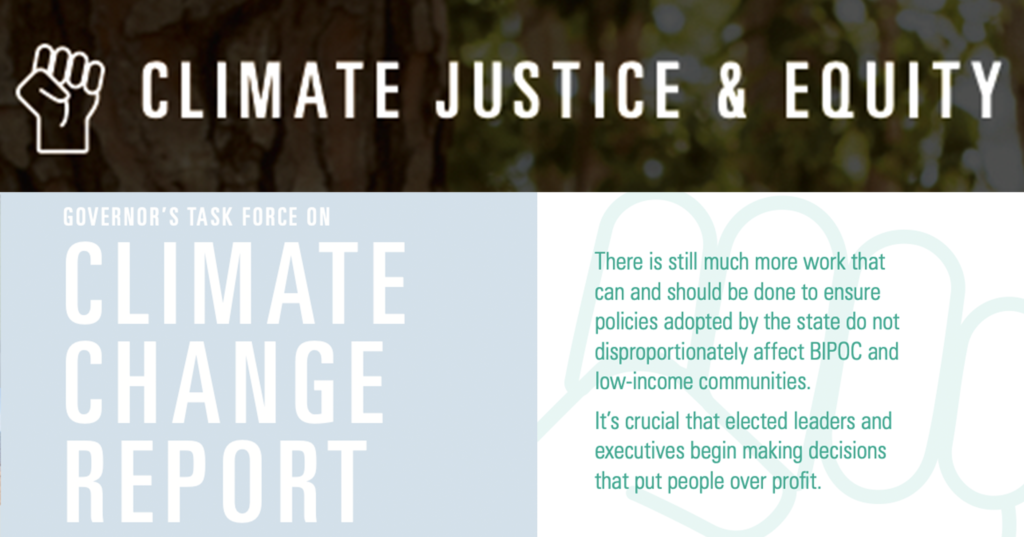

While the term environmental justice may not seem threatening, one member of the Task Force taught fellow members that environmental justice requires shifting “the burden of proof to polluters” and eliminating America’s bedrock “innocent until proven guilty” standard for businesses accused of polluting with racist intent. Assuming that a business is guilty until proven innocent is a complete reversal of one of our country’s greatest hallmarks and it is scary to think that we are even considering this idea.
Continuing on the green path, Evers also proposes the Public Service Commission (PSC) to take the “social cost of carbon” into account when they approve or deny new utility construction projects. The social cost of carbon, according to Evers’ proposal, “is an estimate of the economic damages that would result from emitting one additional ton of greenhouse gas into the atmosphere.” This is an almost entirely subjective metric… which is probably why Evers would require the metric to be re-evaluated every two years.
The Governor’s proposed budget would also bring the radical climate justice agenda into your kids’ classrooms. All of their classrooms. The bill requires education on climate change and how to fight climate change in science, English language arts, social studies, and mathematics curriculum recommendations by DPI.
The Governor also proposes:
- Double the amount that utilities must contribute, from 1.2% of their annual operating revenues to 2.4%, to the Focus on Energy program. This will raise taxes on your energy bill by $100 million every year
- $100 million in project revenue bonds to invest in energy conservation projects for state government and the UW System
- Research creating a carbon market, where Wisconsin would potentially buy permits to emit more carbon dioxide than allotted or sell permits if we emit less
- Require all local governments to develop “comprehensive” local hazard mitigation plans against climate change and include climate change in their community health improvement assessments
- Fund state and local “climate risk assessment and resiliency plans” to identify places that might be impacted by climate change and recommend changes
Health Care And Medicaid
The Governor has once again proposed expanding Medicaid. This time, he claims accepting the Obamacare expansion money would cover 90,900 new enrollees and save the state $624 million GPR. Evers would immediately spend those anticipated savings on increases in Medicaid reimbursement rates to various health care providers and expanding Medicaid services, among other initiatives.
What Evers still doesn’t understand is that Medicaid expansion is no free lunch. Wisconsinites would still have to foot the bill for 10% of new enrollee’s coverage with their state taxes, while paying the other 90% with their federal taxes. Medicaid expansion in states like Oregon, Minnesota, and Oregon has, despite the same promise being made here that it would save state taxpayers money, wreaked havoc on their state budgets because of an unexpected increase of enrollees and predictable higher costs.
But if Evers doesn’t get the Medicaid expansion that he wants, he is planning to fall back on the “public option” that he wants to start up no later than 2025. A public option is a government-run healthcare plan that, in theory, would create competition and lower costs in the insurance market. In practice, a public option with massive government subsidies tends to force out private insurance providers, warping the market, limiting healthcare options and dramatically increasing the cost of healthcare.
Evers’ other major healthcare proposal is an attempt to control prescription drug costs. His reform plan begins with a new Office of Prescription Drug Affordability and a Prescription Drug Affordability Review Board that will regulate the prescription drug supply chain, create drug price limits, and look into creating a prescription drug purchasing entity.
The Governor is also proposing:
- Cap patient copay for a month’s worth of insulin at $50
- Repeal the childless adult work requirement for Medicaid
- Give state subsidies for premium payments to people who earn up to 250% of the federal poverty line
- “Fully fund” Wisconsin’s $200 million reinsurance program for health insurance companies
- Eliminate copay on prescription drugs for medicaid recipients
- Pursue “health equity” initiatives, including a $25 million non-medical Medicaid community health benefit and a “Health in All Policies Action Team”
- Fully fund the SeniorCare program
- “Provide an 11.5 percent increase to nursing home rates in fiscal year 2021-22 and an additional 11.7 percent increase in fiscal year 2022-23”
Transportation
The spotlight was on transportation funding during the last budget debate, but that issue has been sidelined this time around. In the last budget, the Governor proposed an 8 cent gas tax increase and the return to indexing which would have automatically increased the gas tax each year without a vote of the Legislature. While the Republican Legislature would not agree to Evers’ gas tax increase, they did eventually vote for a transportation budget that increased overall funding $600 million by increasing the vehicle registration fee, the Title fee and other fees.
The government’s economic shutdown over COVID-19 has had a big impact on the transportation fund. The state expected to collect $1.99 billion in gas tax, title fees, annual registrations, and other fees during FY20. Instead, it brought in $1.90 billion. That’s 4.5% less than expected.
Still, there’s no talk of a gas tax increase and actual road funding still goes up if only a little. Evers has state highway rehabilitation going up $48 million, major projects going up $1.5 million, and general transportation aid (GTA) to locals going up 2% a year. He wants to spend 68% less on the southeast mega projects, but that’s partly because some are reaching completion.
Despite railing against bonding during the last budget debate, Evers wants to bond for $555.8 million for transportation. That’s the highest level since 2017, three budgets ago. There was $326 million in bonding in the last budget.
Overall, Evers’ DOT budget is $250 million less than the 2019-21 budget. He wants to spend a grand total of $6.6 billion compared to $6.4 billion last time around.
Other Initiatives And Items Of Interest
As we said at the top, the number of new policy initiatives and spending items contained within Gov. Evers’ 2021-2023 budget is staggering and almost unimaginable. With this preliminary analysis, we have tried to give you, the taxpayer, an overview of his proposal, a general look at the taxes and spending Evers is advocating for and a brief description of the most consequential and controversial items he is pushing. We have, by no means, covered every last important item contained within his budget. Some of those include:
- Overturning Act 10
- Reinstating the Prevailing Wage requirement on certain construction projects
- Increasing minimum wage to $10.15 an hour by 2024, study how to increase it to $15 an hour
- Giving Wisconsin Economic Development Corporation (WEDC) a $238 million GPR increase to help individuals and businesses recover from COVID-19
- Creating a new $100 million venture capital program to invest in startup Wisconsin businesses
- Spending $79.5 million to upgrade the disastrous Unemployment Insurance application system
- Removing the one week waiting period before you are paid unemployment, which helps root out fraud
- Removing drug testing requirements for those applying for unemployment
- Spending $204 million on broadband expansion
In coming days, MacIver will publish a detailed analysis of every subject area of the Governor’s budget.
If you have a specific question or would like more information on a spending initiative, please send us a note at info@maciverinstitute.com.


